|
Books Should Be Free Loyal Books Free Public Domain Audiobooks & eBook Downloads |
|
|
Books Should Be Free Loyal Books Free Public Domain Audiobooks & eBook Downloads |
|
Travel Books |
|---|
Book type:
Sort by:
View by:
|
By: Mark Twain (1835-1910) | |
|---|---|
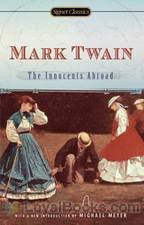 The Innocents Abroad
The Innocents Abroad
When you dive into Mark Twain’s (Samuel Clemens’) The Innocents Abroad, you have to be ready to learn more about the unadorned, ungilded reality of 19th century “touring” than you might think you want to learn. This is a tough, literary journey. It was tough for Twain and his fellow “pilgrims”, both religious and otherwise. They set out, on a June day in 1867, to visit major tourist sites in Europe and the near east, including Greece, Turkey, Lebanon, Syria, “the Holy Land”, and Egypt... | |
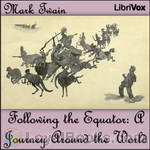 Following the Equator: A Journey Around the World
Following the Equator: A Journey Around the World
Following the Equator (American English title) or More Tramps Abroad (English title) is a non-fiction travelogue published by American author Mark Twain in 1897. Twain was practically bankrupt in 1894 due to a failed investment into a “revolutionary” typesetting machine. In an attempt to extricate himself from debt of $100,000 (equivalent of about $2 million in 2005) he undertook a tour of the British Empire in 1895, a route chosen to provide numerous opportunities for lectures in the English language... | |
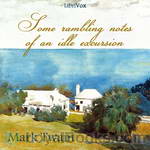 Some Rambling Notes of an Idle Excursion
Some Rambling Notes of an Idle Excursion
Written for the Atlantic magazine in 1877, this is a collection of stories about a trip Mark Twain made with some friends to Bermuda. It contains fascinating descriptions of Bermuda the island, and some of its people as well as an explanation of why Bermuda's houses are "so white". | |
By: Charles Dickens (1812-1870) | |
|---|---|
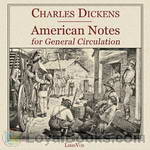 American Notes for General Circulation
American Notes for General Circulation
American Notes for General Circulation is a travelogue by Charles Dickens detailing his trip to North America from January to June, 1842. While there he acted as a critical observer of these societies almost as if returning a status report on their progress. This can be compared to the style of his Pictures from Italy written four years later, where he wrote far more like a tourist. His American journey was also an inspiration for his novel Martin Chuzzlewit. | |
 Pictures from Italy
Pictures from Italy
e: Dickens takes time off his novels to give an account of travels which he and his family undertook in France and Italy. There are vivid descriptions of the places, but also of the people and their lives. | |
By: Jules Verne (1828-1905) | |
|---|---|
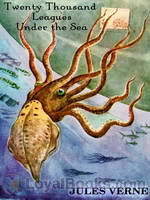 Twenty Thousand Leagues Under the Sea
Twenty Thousand Leagues Under the Sea
An early science fiction novel written by the second most translated author, French writer Jules Verne, the classic tale depicts an incredible sea expedition on board a state-of-the-art submarine. First published in 1870 and a part of the Voyages Extraordinaires series, the novel is regarded as one of the most thrilling adventure stories and one of Verne’s greatest pieces of work. Immersed in themes of exploration, avant-garde technology, and man’s insatiable desire for knowledge and scientific progression, Twenty Thousand Leagues Under the Sea has been an influence for many writers as well as an inspiration for numerous film adaptations... | |
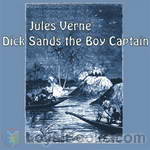 Dick Sands the Boy Captain
Dick Sands the Boy Captain
Dick Sands, a youth of fifteen, must assume command of a ship after the disappearance of its captain. Nature’s forces combined with evil doings of men lead him and his companions to many dangerous adventures on sea and in Central Africa. | |
 Celebrated Travels and Travellers, vol. 1
Celebrated Travels and Travellers, vol. 1
The famous writer of great adventure stories Jules Verne wrote also several lesser known, but good non-fiction works. "Celebrated travels and travellers" tells the story of geographical discovery in the same well written and precise manner we are used to finding in Verne’s fiction books. This book is divided into 3 volumes. This is the first volume, named the "Exploration of the World" and it covers the period in the World's history of exploration from B.C. 505 to the close of the 17th century. The second and third volumes are respectively entitled "The great navigators of the 18th century" and "The great navigators of the 19th century".Coordinated by Kristine Bekere and Kajo. | |
 Dick Sand A Captain at Fifteen
Dick Sand A Captain at Fifteen
| |
 Round the World in Eighty Days
Round the World in Eighty Days
| |
By: Robert Louis Stevenson | |
|---|---|
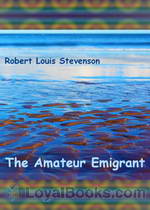 The Amateur Emigrant
The Amateur Emigrant
In July 1879, Robert Louis Stevenson left Scotland to meet his future wife in her native California. Leaving by ship from Glasgow, Scotland, he determined to travel in steerage class to see how the working classes fared. At the last minute he was convinced by friends to purchase a ticket one grade above the lowest price, for which he was later thankful after seeing the conditions in steerage, but he still lived among the ‘lower’ classes. His comments on the experience make interesting reading. His father however was so shocked at the thought of his son associating with people ‘beneath him’ that the work was not published for a number of years, | |
 Travels with a Donkey in the Cevennes
Travels with a Donkey in the Cevennes
| |
 Travels with a Donkey in the Cevennes
Travels with a Donkey in the Cevennes
A classic of travel writing, this book recounts Stevenson's adventures on an extended walk through uplands and mountains in south-western France. Humorous on his own failings as a traveller, and on his travails with Modestine the self-willed donkey, it is also an exploration of peasant life in an area marked by the violence of the wars of religion. This version includes the fragment "A mountain town in France", originally intended as the opening chapter, but often omitted and published as a separate essay. | |
 Inland Voyage
Inland Voyage
As a young man, Stevenson wished to be financially independent and began his literary career by writing travelogues. This is his first published work, written at a time when travel for pleasure was still a rarity. He and a friend traveled by canoe through France and Belgium and he relates how they were thrown in jail, mistaken for traveling salesmen and became embroiled in gypsy life. | |
 Edinburgh Picturesque Notes
Edinburgh Picturesque Notes
| |
By: Jack London | |
|---|---|
 The Cruise of the Snark
The Cruise of the Snark
The Cruise of the Snark (1913) is a memoir of Jack and Charmian London’s 1907-1909 voyage across the Pacific. His descriptions of “surf-riding”, which he dubbed a “royal sport”, helped introduce it to and popularize it with the mainland. London writes: Through the white crest of a breaker suddenly appears a dark figure, erect, a man-fish or a sea-god, on the very forward face of the crest where the top falls over and down, driving in toward shore, buried to his loins in smoking spray, caught up by the sea and flung landward, bodily, a quarter of a mile... | |
By: Rudyard Kipling (1865-1936) | |
|---|---|
 American Notes
American Notes
In American Notes, Rudyard Kipling, the Nobel Prize-winning author of the Jungle Book, visits the USA. As the travel-diary of an Anglo-Indian Imperialist visiting the USA, these American Notes offer an interesting view of America in the 1880s. Kipling affects a wide-eyed innocence, and expresses astonishment at features of American life that differ from his own, not least the freedom (and attraction) of American women. However, he scorns the political machines that made a mockery of American democracy, and while exhibiting the racist attitudes that made him controversial in the 20th century concludes “It is not good to be a negro in the land of the free and the home of the brave... | |
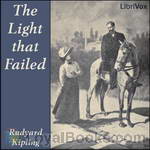 The Light that Failed
The Light that Failed
This novel, first published in 1890, follows the life of Dick Heldar, a painter. Most of the novel is set in London, but many important events throughout the story occur in Sudan or India. It was made into a 1916 film with Jose Collins and a 1939 film by Paramount starring Ronald Colman. | |
 Letters of Travel
Letters of Travel
| |
By: Daniel Defoe (1661?-1731) | |
|---|---|
 From London to Land's End and Two Letters from the "Journey through England by a Gentleman"
From London to Land's End and Two Letters from the "Journey through England by a Gentleman"
| |
 Tour through Eastern Counties of England, 1722
Tour through Eastern Counties of England, 1722
| |
By: Herman Melville (1819-1891) | |
|---|---|
 Omoo
Omoo
| |
By: G. K. Chesterton | |
|---|---|
 What I Saw in America
What I Saw in America
“Let me begin my American impressions with two impressions I had before I went to America. One was an incident and the other an idea; and when taken together they illustrate the attitude I mean. The first principle is that nobody should be ashamed of thinking a thing funny because it is foreign; the second is that he should be ashamed of thinking it wrong because it is funny.” (Gilbert Keith Chesterton) | |
By: Louisa May Alcott (1832-1888) | |
|---|---|
 Shawl-Straps: A Second Series of Aunt Jo's Scrap-Bag
Shawl-Straps: A Second Series of Aunt Jo's Scrap-Bag
| |
By: Stephen Leacock (1869-1944) | |
|---|---|
 Chronicles of Canada Volume 20 - Adventurers of the Far North
Chronicles of Canada Volume 20 - Adventurers of the Far North
This is volume 20 ofThe Chronicles of Canada series. This volume describes the explorers who braved the Canadian Arctic in search of the Northwest Passage, focusing on Samuel Hearne, Sir Alexander Mackenzie, and Sir John Franklin. | |
By: Harriet Beecher Stowe (1811-1896) | |
|---|---|
 Sunny Memories of Foreign Lands, Volume 2
Sunny Memories of Foreign Lands, Volume 2
| |
By: Jacob Abbott (1803-1879) | |
|---|---|
 Forests of Maine Marco Paul's Adventures in Pursuit of Knowledge
Forests of Maine Marco Paul's Adventures in Pursuit of Knowledge
| |
 Rollo in Paris
Rollo in Paris
| |
 Rollo on the Atlantic
Rollo on the Atlantic
| |
 Rollo on the Rhine
Rollo on the Rhine
| |
 Rollo in Naples
Rollo in Naples
| |
 Rollo in Geneva
Rollo in Geneva
| |